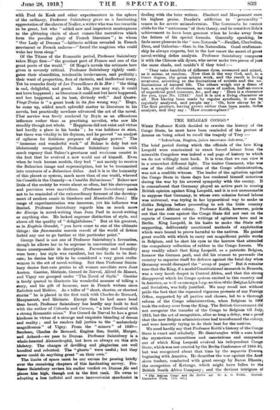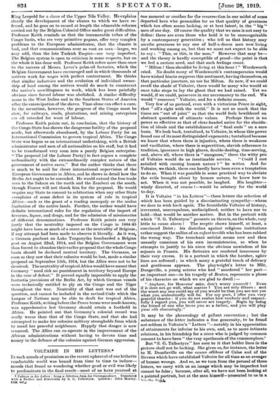THE BELGIAN CONGO.* WHint Professor Keith decided to rewrite the
history of the Congo State, he must have been reminded of the protest of Aeneas on being asked to recall the tragedy of Troy :—
" Infandum, Regina, jubes renovare dolorem." The brief period during which the officials of the late King Leopold were constrained to exact forced labour from the miserable Congolese was indeed a sad page of history to which we do not willingly turn back. It is true that we can view it in a somewhat different light. The traitor Casement, who was one of the chief official critics of the Congo administration, was not a credible witness. The leader of the agitation against the Congo State in those days has rendered himself notorious' during the war by his avowed sympathy with the enemy. II is remembered that Germany played an active part in rousine British opinion against King Leopold, and it is not unreasonable to suppose that Germany, in whose own colonies forced labour was universal, was trying in her hypocritical way to make us dislike Belgium before proceeding to rob the little country of her great African colony. Professor Keith, however, points out that the ease against the Congo State did not rest on the reports of Casement or the writings of agitators here and is Berlin. King Leopold, in his hake to make the State self- supporting, deliberately sanctioned methods of exploitatioa which were bound to prove harmful to the natives. He gained great wealth with which to carry out magnificent public works in Belgium, and he shut his eyes to the horrors that attended the compulsory collection of rubber in the Congo forests. We may readily admit that King Leopold, as a patriotic Belgian, foresaw the German peril, and did his utmost to persuade the country to organize itself for defence against the fatal day when Germany would disregard the "scrap of paper." But it remain" true that the King, if a model Constitutional monarch in Brussels, was a very harsh despot in Central Africa, and that the strong disapproval which his Congo system excited in this country and in America, as will as among a large section of the Belgian Liberals and Socialists, was fully justified. We may recall not without pride the fact that the repeated vigorous protests of our Foreign' Office, supported by all parties and classes, led to a thorougl reform of the Congo administration, when Belgium in 1901 took the colony over from the King. The British Government did not recognize the transfer of the Congo to Belgium till July, 1913, but the act of recognition, after so long a delay, was a proof that the new Belgian administrators had transformed the colony, and were honestly trying to do their best for the natives.
We need hardly say that Professor Keith's history of the Gongs State is exact and scholarly. He disentangles with a sure hand the mysterious committees and associations and companies out of which King Leopold evolved his independent Gongs State, which was not created by the 13erlia Conferenee of 1884-85, but was recognized about that time by the separate Power% beginning. with America. He describes the war against the Aral slave traders, conducted with great energy by Baron Dbanis the occupation of Katanga, which might have fallen to the British South Africa Company; and the devious intrigues of • Ter Ma ets Cone and the Berlin Ad. v A. n. Keith. Oxfor41
Clarendon Prem. net.]
King Leopold for a share of the Upper Nile Valley. He explains clearly the development of the abuses to which we have re- ferred, and he goes on to record at length the admirable reforms carried out by the Belgian Colonial Office under great difficulties. Professor Keith reminds us that the innumerable tribes of the Congo basin, who are very primitive pagans, offer very complex problems to the European administrator, that the climate is bad, and that communications over so vast an area—larger, we may add, than the late Turkish Empire—are very imperfect. The Belgian system is open to criticism in some respects, but on the whole it has done well. Professor Keith refers more than once to the success of Messrs. Lever's palm-oil factories, which the Belgian Government have encouraged and in which thousands of natives work for wages with perfect contentment. He thinks that similar industries and the evolution of individual owner- ship of land among the natives would do much to counteract the native's unwillingness to work, which has been painfully obvious since forced labour was abolished. A similar difficulty arose in the West Indies and in the Southern States of America after the emancipation of the slaves. Time alone can effect a cure. In the meantime, however, the progress of the Congo must be slow, for railways, roads, plantations, and mining enterprises are all retarded for want of labour.
Professor Keith points out, in conclusion, that the history of the Congo State has shown the dangerous futility of the proposal made, but afterwards abandoned, by the Labour Party for an International Commission to govern tropical Africa. The Congo State was begun as an international undertaking, with a British administrator and men of all nationalities on his staff, but it had to be transformed very soon into a purely Belgian enterprise. "The proposal [of the Labour Party] in fact argues a complete unfamiliarity with the extraordinarily complex nature of the government of native races." But the author thinks that there is much to be said for closer international supervision of the European Governments in Africa, and he shows in detail how the Berlin Act ought to be amended. He would extend the free trade area to the Sahara on the north and the Zambezi on the south, though France will not thank him for the proposal. He would require any State to consent to arbitration when any other State complains of some defect in its system of rule in tropical Africa—such as the grant of a trading monopoly or the undue limitation of the native lands. Further, the author would have definite international rules for the regulation of the import of firearms, liquor, and drugs, and for the admission of missionaries of different denominations. Professor Keith points out very justly that the neutrality imposed on the Congo in 1884-85 might have been as much of a snare as the neutrality of Belgium, if any attempt had been made to observe it literally. As it was a German gunboat on Lake Tanganyika bombarded a Belgian post on August 22nd, 1914, and the Belgian Government were thus forced to abandon their earlier proposal that the whole Congo basin should be declared neutral territory. The Germans, as soon as they saw that their colonies would be lost, made a similar proposal on September 15th, 1914, but the Allies were not to be deceived. The neutrality of tropical Africa would have meant that Germany "need risk no punishment in territory beyond Europe in the case of defeat." It proved equally impossible to apply the fantastia provisions of the Berlin Act, by which German vessels were technically entitled to ply on the Congo and the Niger throughout the war. Neutrality of that sort was out of the question, and cannot be included in the revised Code which the League of Nations may be able to draft for tropical Africa. Professor Keith, writing before the Peace terms were made known, was apprehensive lest Germany should retain a foothold in Africa. He pointed out that Germany's colonial record was really worse than that of the Congo State, and that she had attempted to make her colonies military strongholds from which to assail her peaceful neighbours. Happily that danger is now removed. The Allies can co-operate in the improvement of the African administrations without having to devote time and money to the defence of the colonies against German aggression.







































 Previous page
Previous page